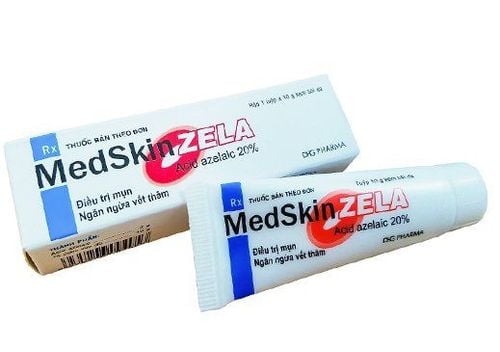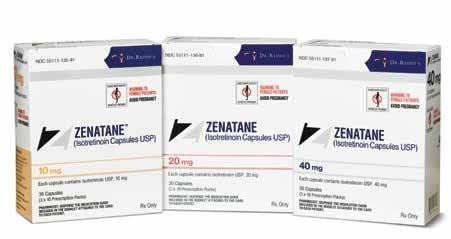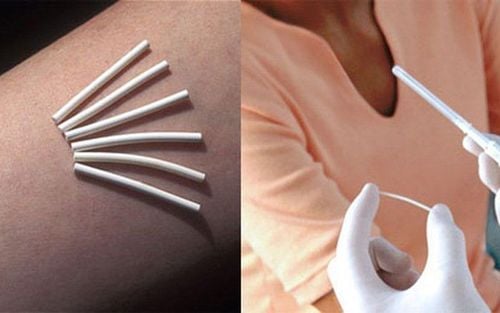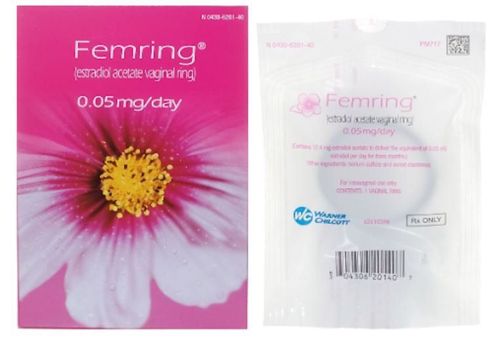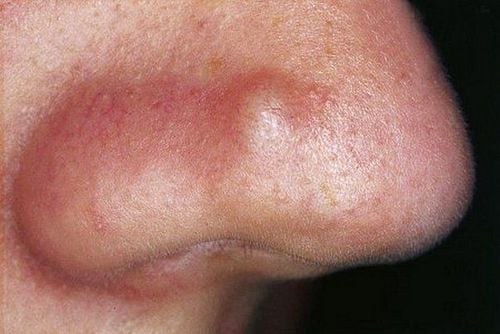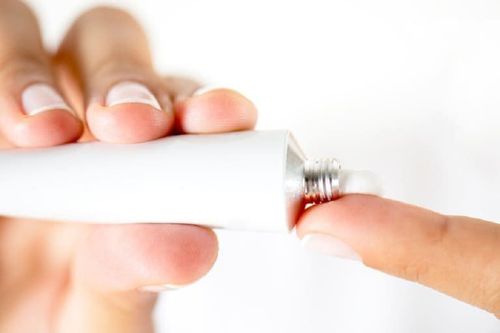This is an automatically translated article.
Sometimes, we notice the sudden appearance of acne breakouts for a short time just before and during the menstrual period. This is because hormonal changes in the body have affected the sebaceous glands, making them overactive and producing excess oil, clogging the pores, leading to the formation of internal acne. details.
1. What is hormonal acne?
Hormonal acne is often related to the fluctuations of hormones in the human body. Hormonal acne can affect people of all ages, especially puberty. It occurs most commonly in women, and several factors that contribute to hormonal acne often include menstruation and menopause. It is estimated that up to 50% of women between the ages of 20 and 29 have acne, including 25% of women aged 40 to 49.
There are actually mixed opinions when it comes to hormonal acne. Although experts say hormones are not the main cause of adult acne, hormonal imbalances can contribute to it in adults with medical conditions. latent.
Under certain circumstances, adults with acne may not have any hormone problems. This makes diagnosing and treating acne more difficult.
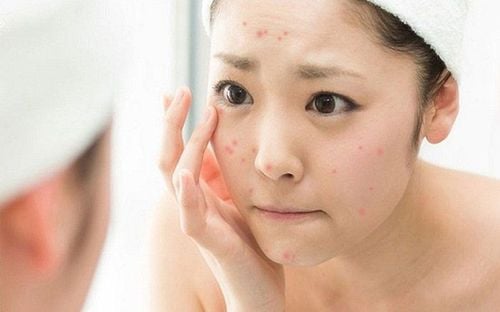
Tình trạng mụn trứng cá do nội tiết tố có thể ảnh hưởng đến mọi lựa tuổi, đặc biệt là tuổi dậy thì
2. Features of hormonal acne
During puberty, hormonal acne often appears on the T-zone of the face, including the forehead, nose, and chin.
In adulthood, hormone-related acne tends to form in the lower areas of the face, including under the cheeks and around the jawline.
In general, hormonal acne appears in many different forms, such as blackheads, whiteheads, nodules or cysts. Acne cysts are formed deep below the skin and have no head on the surface of the skin. These acne bumps usually feel soft to the touch.
Hormonal acne can be caused by the following factors:
Menopause Menopause Polycystic ovary syndrome Increased androgen levels Specifically, these hormonal disturbances can worsen aggravate acne problems by increasing:
Production of sebum (oil) in the pores Overall dermatitis Congestion of skin cells in hair follicles Production of acne-causing bacteria, such as Propionibacterium acnes.
3. Acne and Menopause
Many women start going through menopause in their 40s and 50s. This causes the sex hormones in the body to naturally decline and leads to the cessation of menstruation.
Some women report experiencing skin problems as they enter menopause, including dry skin, rashes, increased skin sensitivity, and even acne breakouts.
Acne prone skin during menopause can be due to hormonal disturbances. At the onset of menopause, a woman's body undergoes the following dramatic changes. The hormones estrogen and progesterone are produced in increasingly scarce amounts and can lead to symptoms such as hot flashes, irregular menstrual cycles or skin problems.
Skin cells also lose the ability to retain moisture and take more time to renew themselves and heal damage. The skin becomes thinner and less elastic than before, creating conditions for acne spots to appear.
Even if you use hormone replacement therapy (HRT) during menopause, you can still experience acne. This is because some HRTs use the hormone progestin to replace the estrogen and progesterone your body has lost. The introduction of this hormone into the body can cause the skin to develop acne.
In most cases, prescription drugs can clear up menopause acne, Some people can also successfully get rid of acne thanks to natural treatments. Ideally, you should consult with your doctor about the right treatment options for you.

Mãn kinh dẫn đến chu kỳ kinh nguyệt không đều
4. Acne during pregnancy
Pregnancy is another time when your hormones fluctuate and cause androgen hormone levels to rise, leading to acne.
According to research, more than half of pregnant women suffer from acne problems. People who are already prone to acne are at the highest risk of experiencing this problem during pregnancy.
During the first trimester of pregnancy, hormone levels in a woman's body will be at their highest. Many people believe that, if pregnant women don't experience any breakouts during the first trimester, there's a good chance they won't have breakouts for the rest of their pregnancy either. In fact, pregnancy acne can flare up for the first time at any stage of pregnancy, including postpartum.
5. Traditional Treatments for Hormonal Acne
The following are the most common treatments for hormonal acne, including:
Oral contraceptives Oral contraceptives may be indicated for hormonal acne conditions element. These medications usually contain ethinylestradiol along with one of the following:
Drospirenone Norethindrone Norgestimate When taken together, these agents target the hormones that can cause acne. Oral contraceptives are especially helpful during periods of high hormone levels, such as ovulation.
However, oral contraceptives should not be used by people with a history of breast cancer, high blood pressure or blood clots. In addition, when taking birth control pills to treat hormonal acne, you should avoid smoking.
Antiandrogen
This drug works by reducing the levels of androgen hormone in your body. A drug called spironolactone (Aldactone) also has anti-androgen effects, although it is commonly used primarily to treat high blood pressure. The use of spironolactone can prevent the body from producing more androgen hormones and help keep hormone levels more stable.
Retinoids
If your hormonal acne is mild, you can use topical retinoids. This is because retinoids are derived from vitamin A and are available in forms such as creams, gels and lotions containing over-the-counter retinoids.
If you want to use a retinoid to treat hormonal acne, it's important to wear sunscreen daily as it can increase the risk of sunburn and worsening of acne. should be more severe.
6. Natural remedies to treat hormonal acne
In some cases, natural treatments can be used to get rid of mild hormonal acne. Natural remedies often cause less side effects but are less effective than prescription drugs.
Here are some natural remedies that you can apply to treat hormonal acne:
Green Tea : Widely known for its amazing anti-inflammatory effects in the body. Besides following a skin care regimen, you can drink a few more cups of green tea every day. In addition, you should also choose a shower gel, cleanser or topical gel containing at least 2% green tea extract to repel ugly acne spots on the skin. Alpha hydroxy acid (AHA): This is a plant acid, derived mainly from citrus fruits. AHAs work to remove dead skin cells that clog pores - the cause of acne. In addition, it also contributes to minimizing the formation of acne scars. Currently, AHAs are added to masks or creams. However, when using products with AHAs, you should wear adequate sunscreen when outdoors as they can increase your skin's sensitivity to the sun.
7. What to eat and what to avoid with hormonal acne?
In fact, diet also plays an important role in the treatment of hormonal acne. Certain foods, especially anti-inflammatory foods, can effectively help prevent acne. Plant-based foods are high in antioxidants that reduce inflammation and help skin appear brighter.
When you have hormonal acne, you should consider limiting your consumption of the following foods:
Sugar Red meat Dairy products Refined carbs, eg pasta or white bread
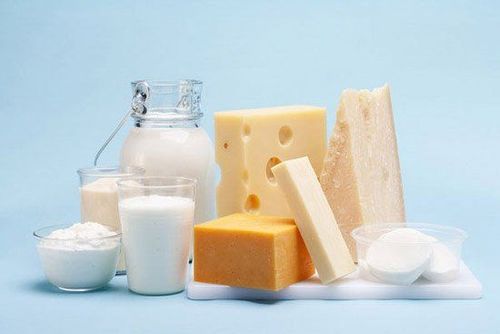
Khi bị mụn trứng cá do rối loạn nội tiết tố, bạn nên hạn chế các sản phẩm từ sữa
8. How to control hormones and acne?
If you are pregnant or planning to become pregnant, you should avoid all acne medications and consult your doctor about other alternatives. This is because some acne medications contain chemicals that are dangerous to an unborn baby.
Some measures that you can apply to control your hormones as well as your acne condition include:
Take care of yourself: A balanced diet and healthy lifestyle will help help you keep a fit body and better control your body. In particular, eating more foods rich in phytoestestrogens, such as soybeans, can also help you balance your hormone levels. Skin care: You should maintain a regular skin care routine, combined with using products specifically formulated for acne-prone skin and supplementing with any medications as directed by your doctor. Manage stress: Stress is one of the triggers for overactive sebaceous glands and makes acne worse.
Please dial HOTLINE for more information or register for an appointment HERE. Download MyVinmec app to make appointments faster and to manage your bookings easily.
References: healthline.com, int.eucerin.com




